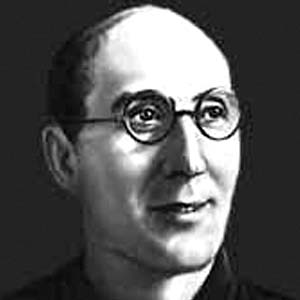Sergei Mikhailovich Tretyakov (в; 20 June 1892, Goldingen, Courland Governorate (modern day Kuldīga, Latvia) – September 10, 1937, Moscow) was a Russian constructivist writer, playwright and special correspondent for Pravda.
He graduated 1916 from the department of law at Moscow University. He began to publish in 1913 and just before the Russian Revolution he became associated with the ego-futurists. Soon after the publication of Iron Pause, he became heavily involved in the Siberian futurist movement known as Creation along with artists such as Nikolay Aseyev and David Burlyuk. Perhaps his most famous play at the time was the anti-imperialist Roar China! (1926), about the Wanhsien Incident.
Tretyakov was one of the founders of the constructivist journal LEF, (1923–1925), and its successor Novyi LEF (New LEF)(1927–1928), and of the associated artistic movement, whose main driving force was the poet Mayakovsky. They declared war on ‘bourgeois’ culture and claimed that the experimental avant garde works they produced were the artistic voice of the Bolshevik revolution. Boris Pasternak did not believe that any of the group actually wanted to destroy pre-revolutionary art, with one exception – “The only consistent and honest man in this group of negationists was Sergei Tretyakov, who drove his negation to its natural conclusion. Like Plato, Tretyakov considered that there was no place for art in a young socialist state.”
His first play, Earth Rampant, also known as The World Turned Upside Down, premiered on March 4, 1923, directed by Vsevolod Meyerhold, was a commercial success that ran to 44 performances in 11 weeks, rescuing Moscow’s Sohn Theatre, in which it was staged, from imminent bankruptcy. It was dedicated to ‘the Red Army and the first soldier of the RSFSR, Leon Trotsky’. His next two of Tretyakov’s first plays, Can You Hear Me. Moscow? and Gas Masks were directed by the young Sergei Eisenstein. The latter was staged in the Moscow Gas Works, for maximum realism. In 1924 Sergei Tretyakov made a lengthy visit to China, where he taught Russian literature and collected materials for some of his later publications. Roar China (Rychi Kitai) had its premier at the Meyerhold Theatre on January 23, 1926, and later went on foreign tour, and on tour of provincial theatres in the USSR. Tretyakov also wrote the controversial “I Want a Baby” (“I Want a Child”) (1926), which has seen recent performances in Europe and America. The play advocated selective breeding for the purposes of political (not racial) purity. Meyerhold immediately accepted it for production, but then spent four years battling with the censorship to get it put on stage. Between 1930 and 1931 Tretyakov travelled in Germany, Denmark, and Austria. Before he fell foul of the authorities he translated and popularised other European writers such as Bertolt Brecht. Brecht was also familiar with Tretyakov’s literary work and indeed stayed with him in 1935. Tretyakov contributed song lyrics to the film Pesn’ o geroyakh (Song of Heroes) by Joris Ivens set in music by Hanns Eisler.
Tretyakov was arrested on July 25, 1937 and charged with espionage. He had fallen under suspicion because of his contacts with foreign writers, and because the political attitudes he had expressed in the 1920s were no longer tolerated. His play “I Want a Baby” was denounced in Pravda in December 1937 as “a hostile slur on the soviet family.” He was sentenced to death on September 10, 1937, though in the introduction to the English publication of I Want a Baby, Robert Leach says it seems that in a last act of defiance he threw himself to his death down the stairwell at Butyrka prison. It was standard procedure for those sentenced to death to be photographed prior to execution: the last photograph of Tretyakov, staring defiantly at the camera, is reproduced in David King, Ordinary Lives. Tretyakov was posthumously rehabilitated in 1956.


10 thoughts on “Kaminos”
Was Nicholas related to Alexander Saslavsky who married Celeste Izolee Todd?
Anyone have a contact email for Yair Klinger or link to score for Ha-Bayta?
wish to have homeland concert video played on the big screen throughout North America.
can organize here in Santa Barbara California.
contacts for this needed and any ideas or suggestions welcomed.
Nat farber is my great grandpa 😊
Are there any movies or photos of max kletter? His wife’s sister was my stepmother, so I’m interested in seeing them and sharing them with his wife’s daughter.
The article says Sheb recorded his last song just 4 days before he died, but does not tell us the name of it. I be curious what it was. I’d like to hear it.
Would anyone happen to know where I can find a copy of the sheet music for a Gil Aldema Choral (SATB) arrangement for Naomi Shemer’s “Sheleg Al Iri”. (Snow on my Village)?
Joseph Smith
Kol Ram Community Choir, NYC
שלום שמעון!
לא שכחתי אותך. עזבתי את ישראל בפברואר 1998 כדי להביא את בני האוטיסט לקבל את העזרה המקצועית שלא הייתה קיימת אז בישראל. זה סיפור מאוד עצוב וטרגי, אבל אני הייתי היחיד עם ביצים שהביא אותו והייתי הורה יחיד בשבילו במשך חמישה חודשים. הוא היה אז בן 9. כעת הוא בן 36 ומתפקד באופן עצמאי. נתתי לו הזדמנות לעתיד נורמלי. בטח, אבות כולם חרא, אומרים הפמינציות, אבל כולם צריכים לעבוד כמטרות במטווחי רובה!
משה קונג
(Maurice King)
Thank you for this wonderful remembrance of Herman Zalis. My late father, Henry Wahrman, was one of his students. Note the correct spelling of his name for future reference. Thank you again for sharing this.
Tirza Wahrman (Mitlak)
amazing zchuso yagein aleinu, he wrote the famous niggun Lefichuch that is sung in almost every Israeli Yeshiva